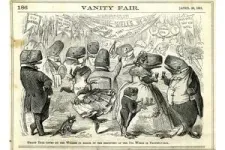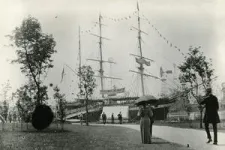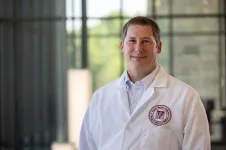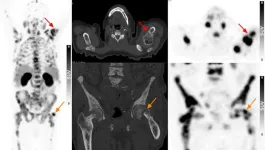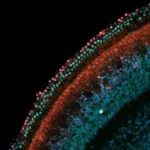(Press-News.org) CHAMPAIGN, Ill. — The whaling industry helped drive industrialization in the 19th century, with whale oil used to light lamps and lubricate machinery. Even after petroleum replaced whale oil as an energy source in the U.S., whaling continued to be part of our cultural imagination and helped develop the idea of an energy industry, said University of Illinois Urbana-Champaign English professor Jamie L. Jones.
Her new book, “Rendered Obsolete: The Afterlife of U.S. Whaling in the Petroleum Age,” examines the influence of a dying industry during the massive energy transition from the organic fuel sources of the 19th century, including whale oil and wood, to the extraction of fossil fuels. The topic is relevant to the current moment, as we consider how to shift away from fossil fuels to renewable energy sources, Jones said.
“As people try to decide how to disengage from a fossil fuel-intensive life, looking at that historical moment can teach us how we might adapt,” she said. “We can’t look around and say this is what the world looks like after fossil fuels. We can say what the world looks like without whale oil. There once were generations of people who didn’t think they could live without it. It offers the opportunity to see how things look after something has ended.”
Different types of energy systems shape culture and our way of life, including labor, infrastructure and political structures. The transition to a new energy source offers a way to think about how the world is changing, and how our lives are shaped by the energy we use, Jones said.
“The nineteenth-century U.S. whale oil industry operated on a different scale than petroleum eventually would; it was smaller, less politically powerful than oil, its applications less extensive and varied, its product, whale oil, less ubiquitous in everyday life of the nineteenth century than petroleum would become in the twentieth and twenty-first centuries,” she wrote.
Even though the whaling and petroleum industries were vastly different, the early fossil fuel industry was shaped by whaling. Whalemen moved to jobs in the oil fields, and the language and imagery of whaling was used to describe oil drilling. Both industries supplied the demand for lighting oil, and, during the transition from one to the other, energy became a system and a segment of the economy, Jones said. Thinking about the dangers of whaling can help us focus on the dangers of fossil fuel production, she said.
“The violence of whaling is so clear. The violence of oil extraction and the violence of climate change isn’t as immediate and spectacular. Climate change is slow violence. I think it’s really important to pay attention to the way fossil fuel extraction and climate change harm people,” she said.
Jones was inspired to research the whaling industry by her love of “Moby-Dick.” She views the novel as a work of energy theory – a critique of extractive capitalism, an account of how work and life in the U.S. are profoundly shaped by it and a meditation on the looming threat of resource exhaustion.
“In 1851, when the novel was first published, ‘Moby-Dick’ embedded a sharp critique of natural resource extraction within an apocalyptic vision of the future: of what the world might look like after the ultimate extinction of whales and even humans, and, on a more local scale, what the thriving industrial whaling ports of the United States will look like when those resources and the wealth that they generated have moved on,” she wrote.
In “Rendered Obsolete,” Jones described how whaling culture became a form of entertainment. As the whaling industry declined in East Coast port towns, places like Nantucket turned to tourism and marketed their quaintness, including their whaling history, to visitors.
Whaling entertainment extended to the Midwest and beyond in two traveling exhibitions that came to Chicago. A promoter organized a rail tour of a whale’s corpse – presented as the “Prince of Whales” – that was “in various states of decay and remediation.” Jones wrote that the dead whale tour was “perfectly continuous with the logics of animal extraction” that brought whale oil, baleen, ambergris and scrimshaws of bones and teeth far inland. A decade later, a New Bedford, Massachusetts, whaling ship sailed to Chicago as an exhibit at the 1893 World’s Columbian Exposition, highlighting the country’s technological progress by offering a contrast between the brutality of whaling and the ostensibly clearer fossil resources powering the future, she wrote.
“Whaling nostalgia” took the form of commemorations, museums, historical writing and a film in New Bedford, which had been the center of the U.S. whaling industry. Jones focused on the racial politics of the commemorations, which portrayed whalemen as white men representing Yankee values – similar to the nostalgia with which the coal industry is portrayed today. The early 20th century commemorations intersected with white supremacy and anti-immigrant sentiment and ignored the fact that whaling crews were multiracial and included nonwhite immigrants and Black Americans who had escaped slavery, she wrote.
At the book’s end, Jones returned to “Moby-Dick” and focused on the illustrations included in the 1930 edition of the book, produced during the “Melville Revival’s” critical reassessment of the novel. Artist Rockwell Kent produced images that resembled 19th-century woodcut engravings but actually were ink drawings that “created a visual language of nostalgia for the obsolete wooden infrastructures of whaling in a form that resembles wood but which is, in fact, all style,” she wrote.
Jones sailed on the Charles M. Morgan – a former working whaling vessel that is now part of the Mystic Seaport Museum – during a 2014 exhibition trip along the East Coast that was the culmination of the ship’s restoration. Its transformation from a working whaling ship to tourist attraction encapsulates the region’s economic history, she wrote, as well as representing the infrastructure left behind by old energy systems.
Editor’s note: To contact Jamie L. Jones, email jaljones@illinois.edu. “Rendered Obsolete: The Afterlife of U.S. Whaling in the Petroleum Age” is available online.
END
Illinois professor describes how whaling shaped U.S. culture even after petroleum replaced it
University of Illinois English professor Jamie L. Jones examines the energy transition from whale oil to fossil fuels and the continuing influence of whaling in her new book “Rendered Obsolete: The Afterlife of U.S. Whaling in the Petroleum Age”
2023-08-14
ELSE PRESS RELEASES FROM THIS DATE:
In battle against pancreatic cancer, grant-funded H-FIRE study offers hope
2023-08-14
Only about 10 percent of patients survive as long as five years after a diagnosis of pancreatic cancer.
“Pancreatic cancer is very hard to treat,” said Irving Coy Allen, professor of inflammatory diseases in the Department of Biomedical Sciences and Pathology at the Virginia-Maryland College of Veterinary Medicine. “It's one of the top five deadliest cancers in the U.S. And it's deadly because by the time you find out that you have a tumor, it's usually metastasized. You can usually treat the local tumor, but how do you treat the metastatic lesions?”
The National Institutes of Health has awarded $2.6 million to a Virginia Tech team ...
Consumers who buy cannabis products containing HHCs could be getting less than they hoped for
2023-08-14
Key takeaways
In the fast-growing marketplace for recreational marijuana and related products, products containing cannabinoids called HHCs are gaining popularity.
The neurological and physiological effects of HHCs are not well understood.
A new study by UCLA chemists is the first to explain how well HHCs bind to receptors in the human body; the scientists also devised a safer way to produce HHCs than the current standard process.
As more of the nation has adopted legal marijuana, a glut of products has emerged in dispensaries that contain the psychoactive ingredient in marijuana, ...
A new way to evaluate the impact of medical research
2023-08-14
Scientific journals and research papers are evaluated by a metric known as their “impact factor,” which is based on how many times a given paper is cited by other papers. However, a new study from MIT and other institutions suggests that this measure does not accurately capture the impact of medical papers on health outcomes for all patients, particularly those in low- or middle-income countries.
To more fully capture a paper’s impact on health, metrics should take into account the demographics of the researchers who performed the ...
Department of Energy announces $112 million for research on computational projects in fusion energy sciences
2023-08-14
WASHINGTON, D.C. - Today, the U.S. Department of Energy’s (DOE) Office of Science (SC), announced $112 million in funding for 12 projects that focus on collaborations among fusion scientists, applied mathematicians, and computer scientists to maximize the use of high performance computing, including exascale computers.
The Scientific Discovery through Advanced Computing (SciDAC) program pairs the Fusion Energy Sciences (FES) program with the Advanced Scientific Computing Research (ASCR) program to explore solving complex ...
Cancer-infecting virus ‘warms up’ cold tumors and improves immunotherapy
2023-08-14
Equipping cancer-infecting, or oncolytic, viruses with tumor-inhibiting genetic cargo stimulates the immune system and helps immunotherapy to shrink or completely clear aggressive tumors in mice, according to a new study in the Journal of Experimental Medicine led by University of Pittsburgh and UPMC researchers. The results pave the way for clinical trials combining oncolytic viruses with immunotherapy.
Oncolytic viruses are genetically modified viruses that target rapidly dividing tumor cells while avoiding normal cells. Oncolytic viruses were originally designed to directly kill cancer cells, but researchers later ...
PSMA PET/CT waives the need for pre-imaging biopsy in elderly patients
2023-08-14
Reston, VA—In elderly patients with suspected prostate cancer, PSMA PET/CT can diagnose advanced disease and aid in therapy selection without the need for a biopsy. Published in the July issue of The Journal of Nuclear Medicine, this new research demonstrates how imaging with PSMA PET/CT can potentially reduce the number of prostate biopsies and associated complications in the elderly while providing accurate staging data.
68Ga-PSMA PET/CT has gained acceptance as a highly sensitive and specific imaging modality for evaluating the extent of disease in prostate cancer patients. In general, PSMA PET/CT is indicated when intermediate ...
How did South African healthcare workers cope during the pandemic?
2023-08-14
A new study by UC Berkeley Anthropology Professor Andrew Wooyoung Kim reveals resilient coping mechanisms used by healthcare workers during the COVID-19 pandemic in metro Johannesburg, South Africa.
Titled “Coping strategies employed by public psychiatric healthcare workers during the COVID-19 pandemic in southern Gauteng, South Africa,”(link is external) Kim's paper was published in PLOS ONE in August. It explores the diverse coping strategies employed by public psychiatric healthcare workers during ...
Scientists outline a new strategy for understanding the origin of life
2023-08-14
Despite decades of progress, the origin of life remains one of the great unsolved problems in science. “The most basic features of biology, that organisms are made of cells, that they pass genetic information through DNA, that they use protein enzymes to run their metabolism, all emerged through specific processes in very early evolutionary history,” says Aaron Goldman, Associate Professor of Biology at Oberlin College. “Understanding how these most basic biological systems first took shape will not only give us greater insight into how life works at the most fundamental level, but what life actually is in the ...
USC Stem Cell studies tune into hearing regeneration
2023-08-14
A deafened adult cannot recover the ability to hear, because the sensory hearing cells of the inner ear don’t regenerate after damage. In two new studies, partially funded by the National Institutes of Health and published in the Proceedings of the National Academy of the Sciences (PNAS), USC Stem Cell scientists explain why this is the case and how we might be able to change it.
“In the non-sensory supporting cells of the inner ear, key genes required for conversion to sensory cells are shut off through a process ...
Government regulation can effectively curb social media dangers
2023-08-14
Government legislation to flag and moderate dangerous content on social media can be effective in reducing harm, even on fast-paced platforms such as X (formerly Twitter) new research shows.
Social media posts such as those that promote terrorism and hate, dangerous challenges that put teen lives at risk, or those that glamorise suicide, pose a significant threat to society. And this harm spreads exponentially, like an infectious disease.
Dr Marian-Andrei Rizoiu from the University of Technology Sydney (UTS) Behavioural Data Science Lab and Philipp J. Schneider from École Polytechnique Fédérale de Lausanne harnessed ...
LAST 30 PRESS RELEASES:
Fecal transplants from older mice significantly improve ovarian function and fertility in younger mice
Delight for diastereomer production: A novel strategy for organic chemistry
Permafrost is key to carbon storage. That makes northern wildfires even more dangerous
Hairdressers could be a secret weapon in tackling climate change, new research finds
Genetic risk for mental illness is far less disorder-specific than clinicians have assumed, massive Swedish study reveals
A therapeutic target that would curb the spread of coronaviruses has been identified
Modern twist on wildfire management methods found also to have a bonus feature that protects water supplies
AI enables defect-aware prediction of metal 3D-printed part quality
Miniscule fossil discovery reveals fresh clues into the evolution of the earliest-known relative of all primates
World Water Day 2026: Applied Microbiology International to hold Gender Equality and Water webinar
The unprecedented transformation in energy: The Third Energy Revolution toward carbon neutrality
Building on the far side: AI analysis suggests sturdier foundation for future lunar bases
Far-field superresolution imaging via k-space superoscillation
10 Years, 70% shift: Wastewater upgrades quietly transform river microbiomes
Why does chronic back pain make everyday sounds feel harsher? Brain imaging study points to a treatable cause
Video messaging effectiveness depends on quality of streaming experience, research shows
Introducing the “bloom” cycle, or why plants are not stupid
The Lancet Oncology: Breast cancer remains the most common cancer among women worldwide, with annual cases expected to reach over 3.5 million by 2050
Improve education and transitional support for autistic people to prevent death by suicide, say experts
GLP-1 drugs like Ozempic could cut risk of major heart complications after heart attack, study finds
Study finds Earth may have twice as many vertebrate species as previously thought
NYU Langone orthopedic surgeons present latest clinical findings and research at AAOS 2026
New journal highlights how artificial intelligence can help solve global environmental crises
Study identifies three diverging global AI pathways shaping the future of technology and governance
Machine learning advances non targeted detection of environmental pollutants
ACP advises all adults 75 or older get a protein subunit RSV vaccine
New study finds earliest evidence of big land predators hunting plant-eaters
Newer groundwater associated with higher risk of Parkinson’s disease
New study identifies growth hormone receptor as possible target to improve lung cancer treatment
Routine helps children adjust to school, but harsh parenting may undo benefits
[Press-News.org] Illinois professor describes how whaling shaped U.S. culture even after petroleum replaced itUniversity of Illinois English professor Jamie L. Jones examines the energy transition from whale oil to fossil fuels and the continuing influence of whaling in her new book “Rendered Obsolete: The Afterlife of U.S. Whaling in the Petroleum Age”

